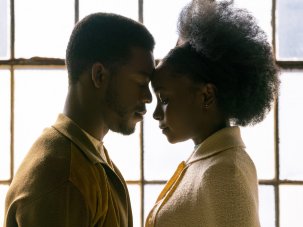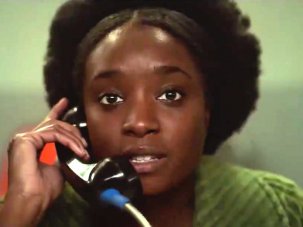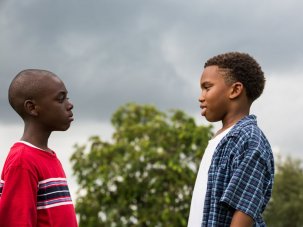If Beale Street Could Talk is in cinemas from 8 February 2018
For 25-year-old Canadian actor Stephan James, taking the role of Alonzo ‘Fonny’ Hunt in Barry Jenkins’ adaptation of the 1974 James Baldwin novel If Beale Street Could Talk was a no-brainer: “Well, it’s James Baldwin. And it’s the first time James Baldwin’s being adapted, ever. To do that with Barry Jenkins – that marriage really excited me.”
Following the astounding critical success of 2016 Oscar-winner Moonlight, expectations for Jenkins’ follow-up have run high. Beale Street doesn’t disappoint. If anything, the director uses Baldwin’s words to take his visually poetic storytelling even further, producing a powerful and elegiac study of the black experience in America. It’s a sublime celebration of love that comes laced with bitter social critique.
James had long admired the acclaimed director’s work, going all the way back to his 2008 debut Medicine for Melancholy. But he hadn’t expected the opportunity to work with him to land in his lap so soon: “It was literally a dream come true,” James explains from underneath a duvet on a Soho hotel room sofa, fighting off a cold. “He’s one of the great filmmakers, one of the great humanists that we have working in the business today. He’s able to just capture the humanity in people in a way that I haven’t seen in a long time.”
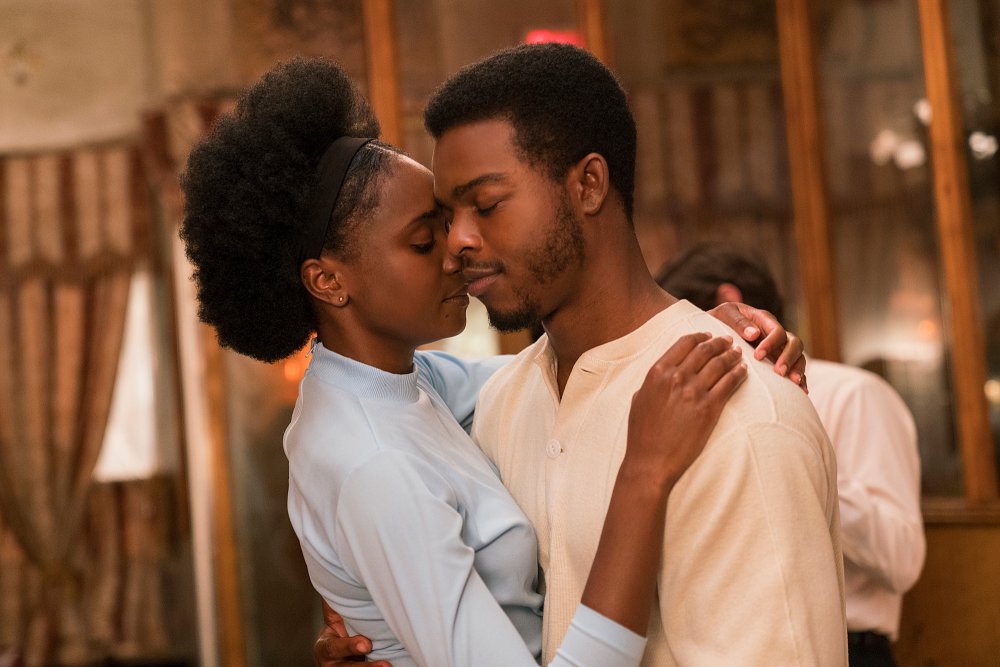
If Beale Street Could Talk (2018)
His character’s story is set in early-1970s Harlem and is told non-linearly through the eyes of Tish (played by newcomer Kiki Layne), a childhood playmate of Fonny’s. The pair’s friendship blossoms into romance but a future together is cruelly scuppered when Fonny is falsely accused of rape and jailed.
For James, although racial injustice forms the backdrop, the centrality of the romance between Fonny and Tish was crucial: “I saw it as a love story at its core but, you know, a black love story, which is something that we don’t often get to see in cinema,” he says. “Two young black people who are like more than lovers, they’re more than best friends. They’re like real soulmates.”
Indeed it’s a sensuousness that reigns as Fonny and Tish’s searching faces fill the screen, as though not only they but the film itself wishes to shut out the brutal ugly world that exists outside of their love, its noises and the threats of interruption drowned out by Nicholas Britell’s seductive score. “It’s such a special thing for cinema, this idea that black love is in existence,” James continues. “We don’t get to see it in this way, and we certainly don’t get to see how much it’s under attack — from this unforgiving world, from a justice system that is supposed to protect you but seemingly fails a particular group of people time and time again.”
Watch the If Beale Street Could Talk trailer
James also notes Jenkins’ continued fascination with representations of masculinity: the film perceives Fonny as Tish does, lush cinematography drinking in images of his tenderness toward her and the dedication to his craft that he has as a sculptor. “Historically there’s been a limited perspective on what black masculinity looks like, what the black male looks like,” explains James. “Barry is sort of radical in that sense; he challenges perspectives.”
In a particularly potent moment, Fonny’s friend Daniel opens up about being wrongly incarcerated. Much is left unsaid but implications of the trauma he suffered behind bars are palpable: “It’s so invaluable what that does to be a fly on the wall in those rooms — have these two men open up and be vulnerable with each other, share their deepest, darkest fears, the things that keep them up at night.”
The actor believes that such images can be compelling in countering stereotypes: “I think it’s about understanding the humanity of these young men who often get written off as statistics,” he theorises. “One in five black men are going to be arrested by the time they’re 40. We never get to see that these people have families who love them, people who they love back, maybe an unborn child that’s about to come into the world. We can’t underestimate how important that is for the psyche of young men who are watching this film and understanding that black men look like Fonny, black men look like Daniel. Black men are artists. Black men love and have people love them back. We can’t underestimate the importance of that imagery. That is such a powerful, powerful thing.”
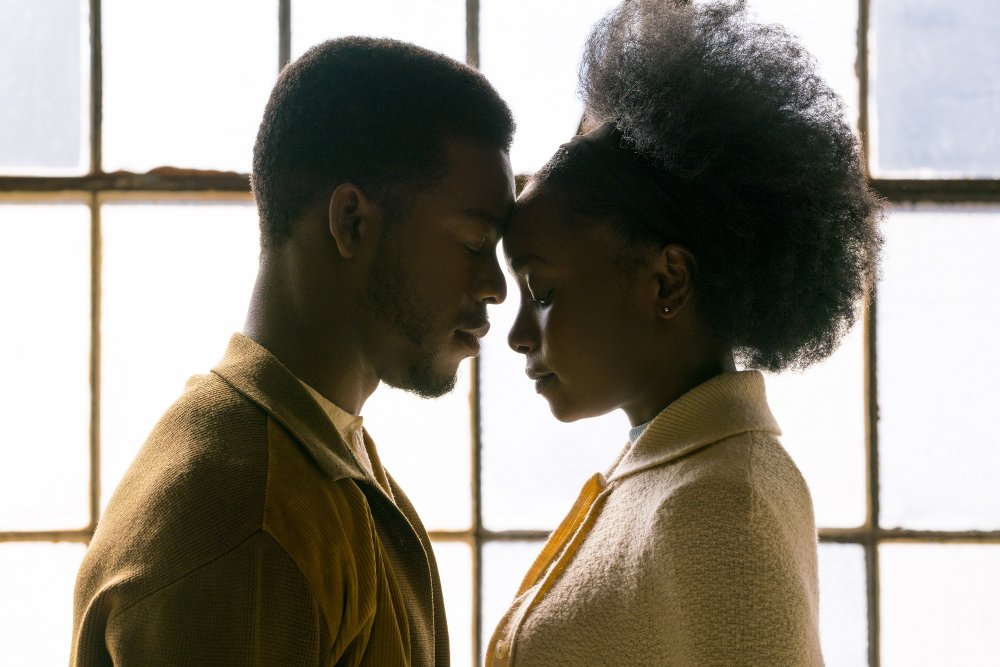
If Beale Street Could Talk (2018)
Ultimately, he sees that the film’s core message is that love – whether familial, erotic, romantic or a pure, idealistic notion of love, even love for your country – can endure in spite of pain, suffering and oppression, as held in Baldwin’s profoundly resonant words spoken by Tish’s mother (a formidable Regina King) to her daughter: “Love brought you here.” “Despite this dark time this couple has found themselves in, this world that has all the chips stacked against them and has threatened their love on a daily basis, you don’t miss the fact that love and hope still exists at the end of this film,” James reflects.
As with his roles in Selma (2014) and Race (2016), James believes that period-set stories can help educate a contemporary audience: “Baldwin wrote these words 45 years ago. But a lot of these issues are probably even more relevant and prevalent today.”
He also sees the wealth and importance of black stories gaining greater recognition in cinema: “We live in a world where Black Panther and BlacKkKlansman and Green Book and Beale Street can exist all at the same time; we can have varied ways of going about talking about our experience. Filmmakers are becoming more unapologetic and studios are giving more opportunities, understanding that people actually want to see these stories, that it’s profitable. While I don’t think that we’ve reached the destination, I’m hopeful for the direction that we’re going in.”
With this standout turn in Beale Street coinciding with a Golden Globe-nominated performance in Amazon series Homecoming opposite Julia Roberts (“she’s one of the greatest actresses of all time – we built a bond that I really wouldn’t trade for anything”) James has certainly proven he has that elusive leading man quality. Next up is 17 Bridges with Chadwick Boseman, and he has his sights set on working with today’s foremost directors: P.T. Anderson, Steve McQueen, Quentin Tarantino, David O. Russell – “I plan to, you know, knock them off one by one,” he says with a disarming cheeky grin. Somehow, I have little doubt he will.





